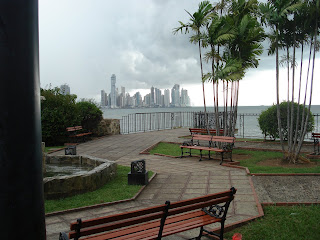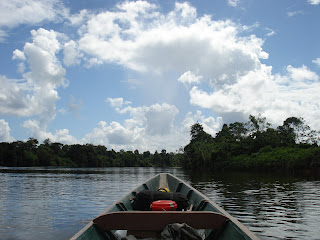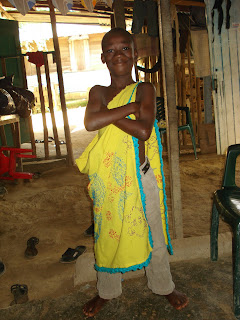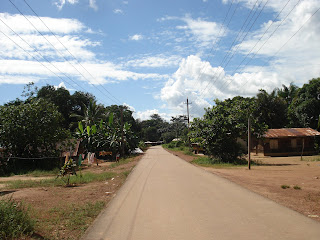The title of this post is the phrase that Ryan and I kept hearing the first day we arrived in our new village. It means two dead people here. Apparently, two men died right before our arrival and their bodies were being brought from the capitol city to our village. A couple PC trainees in our group had experienced deaths in their village during training, so we had some ideas as to what might happen. It was definitely still an experience.
So, the first day at site we put all our stuff in one of the two rooms that our little hut consists of and pitched our hammocks in the other. Sidenote: we have mosquito nets that are made specifically for hammocks, so you look like a giant cocoon once inside. It's pretty sweet. Here is a picture of Ryan tying them up with his headlamp on.
Oh, and I saw a huge spider in the second room right when we finished unloading our stuff into the house. Ryan grabbed our insect spray and went for it, saying it was the same brown spider that our friend Jack had in his house. I replied that this one had a big white bottom part of his body, though. My sexily smart, knows random ish husband replies the white thing is an egg sac. Wonderful. He proceeds to hit the spider with the spray and from where I was standing it looked like a million little ants went running in every direction. They weren't ants. They were teeny tiny spider babies. Welcome to your house in the jungle.
The next day we cleaned the empty room with bleach water (the unfinished wood walls and cement floor) to try to disinfect everything and get the funky stink out. Due to the intense humidity, it takes forever for anything to dry in this country, including our house. Ryan took this time to try to fill every hole big enough for a mouse to come into the house with some hardening foam the PC gave us. To give you a visual on how many holes we had in our house that were big enough for a mouse to come in, if you are standing outside, it looks like a giant marshmallow creature is trying to burst out of every crack. If you're standing inside, it looks like it's trying to get in. We're not really going for aesthetics here in the jungle, though, are we?
By nightfall, the floor and walls were thankfully dry, so we were able to set up our bed and mosquito net to sleep in for the night, which made it feel much more like a home. I was planning on doing the same with the other room the next day. However, the captain of our village informed us that the bodies of the deceased men were arriving midday, so the men of the village were going into the jungle at 9am to dig the graves and he would come get Ryan to help. Here he is looking all ready for the jungle with his machete (in an American way-most of the locals were wearing flipflops). * I will still take a picture of Ryan and I both with our machetes, Vincent, but here is a start!
I decided to try to organize a few things before I ventured out to see what the women were doing (all activities are split by gender here). An 11-year-old boy named Zidani came by and was chatting it up with me while watching me organize our food in meat buckets (they are the only containers that keep out both mice and bugs).

Then two adorable little old ladies came by, Mmma and Dii and sat with me a little while. When I was getting ready to walk to my neighbor's, Ryan comes walking up to let me know that he needed something to pay with I order to go back to helping dig the graves. Apparently, all the men who were working together brought something to contribute to the group such as cigarettes, beer, rum, etc. Very 1950s army-ish, huh? Anyways, we had bought a bottle of Palm Rum before we came, as we were told we should have it on hand to offer our captain or basias (they are the council below the captain; we have 8 in our village) whenever they come over to visit. That stuff is like 80 proof and they just sip a shot or two like it's tea. So, I gave him that to take, which ended up being a hit with the men.
I went over to our neighbor's house, who sent me with another woman to go cook food for all the men who were digging the graves. That was nice because I had some one on one time practicing my language and asking questions about the village. It turns out that one of the dead men was our contact person's big brother and he killed himself by drinking pesticide. The other man was older, in the military and had been sick for a long time (I don't know with what, the people here don't really differentiate between illness, they just say “sick”. Another girl told me maybe it was AIDS, which started my first informal discussion on how HIV/AIDS is trasmitted). After we finished cooking, we carried the food to a central meeting place where I met back up with Ryan. He and the other men were served food there and then went to the family of the other dead man where they were served another meal.
After awhile more people came from the city for the funeral and the bodies arrived. Then the wailing started. I'm talking head thrown to the sky, mouth open, tearing of the clothes wailing. After a few hours we were told we could go home to wash and everyone was meeting in the public, outdoor hall around 8pm for “booko di dia” which literally means breaking the daylight. Basically, we came back and everyone sang for 3 hours straight. One guy would call out a line and everyone would sing it back. No music. Very traditional hymn sounding. Three hours. Let me just say that every day since we've been here Ryan and I have been completely exhausted by about 9pm. So by midnight I felt like I'd been awake for about 3 days. Thankfully, just before my breaking point, women came with sandwiches, cake and coffee and served everyone. Then a guy stood up and proceeded to do standup in Saramaccan for about 4 hours. Considering we only understood random words and no jokes, I focused on trying not to fall asleep and praying fervently that it would end soon. By 4am about ¼ of the people had gone home and we realized the rest were staying through the next day. We hoped our effort was appreciated by the village and quietly left. We decided there was no way in hell we'd be able to get up at 5:30 to come back for the burial so we'd just sleep in. Of course, that meant two different neighbors coming by to wake us up because they were concerned why we had not come out of the house yet.
About midday, we learned that only one of the bodies was buried in the morning as military personnel were coming in from the city in the afternoon for the second burial. We decided to quickly bleach the second room so we could go to the second burial. I was surprised how many people from the military showed up, how many hindustani people are in the military (this shouldn't surprise me, I think they are the majority in Suriname, but for 90% of our time here, we've only been around maroons, so other ethnicities throw me off) and how many women were in the military, especially for how genderfied society is here. I was even more surprised that they brought the military band! After some singing and speeches, a processional started through the village and then into the jungle with the band playing the entire way. They started out playing slowing and solemnly, then it changed to almost jazz and the soldiers were dancing with the casket. Finally, at the grave site, the bugle player did a solo, much like military funerals in the states. The soldiers lowered the casket and left. Then the village men laid freshly cut logs over a lip in the ground they made a couple feet above the casket. Then they laid a sheet of fake linoleum, then put the dirt on top of that. I found it interesting that they did not want any dirt directly on top of the casket. I wonder if there is a specific belief behind that. As you can tell, I did not take any pictures of the cultural events. I didn't want to be another white person with a camera right away but I promise more pictures of our village as time goes on.
There are two things I learned from this experience: one, all the women wear white, blue and black to funeral events, but mostly white. And since all the women here wear plaid koosus (just a piece of cloth that you wrap around your waist as a skirt) all the time, everyone looked like they were wearing the same uniform of some kind, which did not make it any easier to pick out the few women I knew in the crowd. Unfortunately, I stuck out a bit (you know, more than being the only tall, skinny white girl) as I need to invest in a matching funeral koosu. Two, either come early to the booko di dia, go home to nap and come back, or sleep first and then come around midnight with a couple Red Bulls. There is no reason my body wants to stay up for 24 hours straight.
















































































